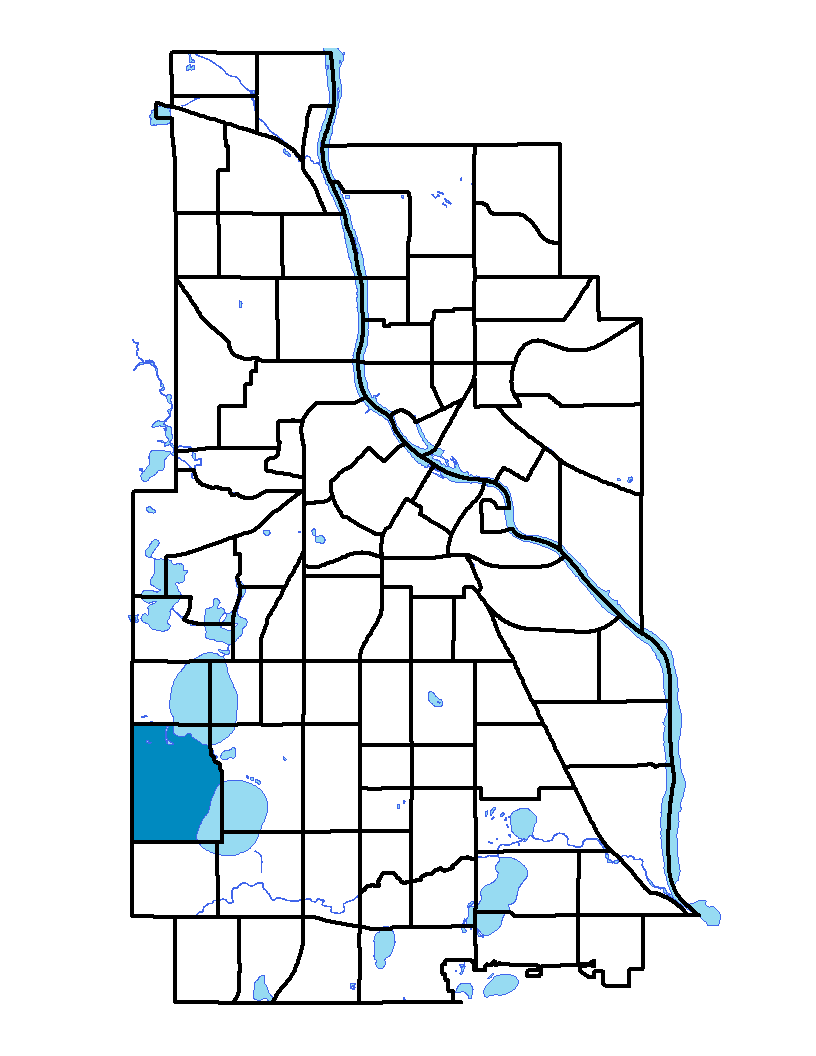Linden Hills is located in southwest Minneapolis. It's bound on the north by 36th Street West and Lake Calhoun, on the east by William Berry Drive and Lake Harriet, on the south by 47th Street West, and on the west by France Avenue, which is the city limit. The neighborhood, named by the developer for the linden trees and rolling terrain, was developed in the 1880s to entice homebuyers to leave downtown for cottages on Lake Calhoun and Lake Harriet. Most of the original cottages have been replaced by large bungalows and Tudors. The Lake Harriet-Como Streetcar ("Trolley") line runs through the neighborhood. Built at the end of the 19th century to connect downtown Minneapolis with the lakes, the historic rail line now only operates between Lake Harriet and Lake Calhoun.
To learn more about the neighborhood association visit: www.lindenhills.org
Indicator Details
| Indicators | Primary Domain | Indicator Value |
Rank |
Tier |
|---|---|---|---|---|
| Transit Accessibility | Transportation | 122.9 | 85 | Bottom |
| Commute Mode Share | Transportation | 15.5% | 78 | Bottom |
| Pedestrian Connectivity | Transportation | 116.1 | 56 | Middle |
| Age of Housing | Housing | 90.9% | 55 | Middle |
| Walkability | Neighborhood Characteristics | 59 | 52 | Middle |
| Household Transportation Costs | Transportation | 18.1% | 52 | Middle |
| Proximity to Brownfield Sites | Environmental Hazards | 4.7% | 43 | Middle |
| Business Retention | Economic Health | 2.7% | 34 | Middle |
| Residential Mobility | Social Cohesion | 82.4% | 34 | Middle |
| Tree Cover | Natural Areas | 29.8% | 30 | Middle |
| Access to Parks and Open Space | Natural Areas | 10.7% | 27 | Top |
| Vacancy Rates | Housing | 5.7% | 26 | Top |
| Travel Time to Work | Employment Opportunities | 21.2 minutes | 26 | Top |
| Long-Term Unemployment | Employment Opportunities | 4.3% | 22 | Top |
| Public Assisted Households | Employment Opportunities | 6.8% | 18 | Top |
| Blood Lead Levels in Children | Housing | 1.9% | 18 | Top |
| Chronic School Absence | Health Systems and Public Safety | 36.7% | 17 | Top |
| Excessive Housing Cost Burden | Housing | 21.0% | 17 | Top |
| Access to Mainstream Financial Services | Economic Health | 11.8% | 12 | Top |
| Low Birth Weight | Health Systems and Public Safety | 3.9% | 12 | Top |
| Violent Crime | Health Systems and Public Safety | 25.4 | 11 | Top |
| Employment Rate | Employment Opportunities | 77.0% | 10 | Top |
| Local Business Vitality | Economic Health | 69.1% | 9 | Top |
| Preschool Enrollment | Educational Opportunities | 83.2% | 9 | Top |
| Voter Participation | Social Cohesion | 44.9% | 7 | Top |
| Adult Educational Attainment | Educational Opportunities | 98.7% | 5 | Top |
| Motor Vehicle Collisions | Health Systems and Public Safety | 0.8 | 5 | Top |
| Preventable Hospitalizations | Health Systems and Public Safety | 1 | 5 | Top |
| Offsite Alcohol Outlets | Neighborhood Characteristics | 0.7 | 3 | Top |
| Residential Proximity to Traffic | Environmental Hazards | 0.0% | 1 | Top |
| School Proximity to Traffic | Environmental Hazards | 0.0% | 1 | Top |
| Proximity to Superfund Sites | Environmental Hazards | 0.0% | 1 | Top |
| Toxic Releases from Facilities | Environmental Hazards | 0.0% | 1 | Top |
| High School Graduation Rate | Educational Opportunities | 81.0% | 1 | Top |
| Reading Proficiency | Educational Opportunities | -% | - | Data N/A |
| School Readiness Scores | Educational Opportunities | -% | - | Data N/A |
| Food Desert | Neighborhood Characteristics | -% | - | Data N/A |

